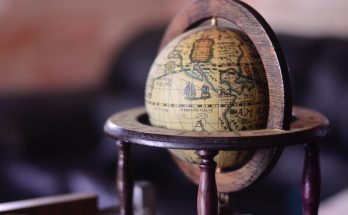By Vincent Poturica
We will conduct the interview in the mental asylum. “Tea will be provided,” the doctor promises over the phone. I thank him. Tea is always good.
My editor has discovered the whereabouts of the author of On Love and Other Difficulties, a single long poem. The slim volume, no more than 80 pages, received positive reviews in India and the UK a decade before. No small feat for a Sri Lankan writer. My editor wants me to speak with the poet now committed to the asylum in a distant Colombo suburb. “Write anything you like, darling. Now get out,” she doesn’t bother to look up from texting on her cell phone. Another phone buzzes in a circle on her desk. She pouts red lips. She is rich, married to a real estate investor whose political connections secured my residence visa as a foreign journalist in a country famous for deporting them and for murdering their own. It’s why I’m writing about a forgotten poet rather than the sudden arrest of the General suspected of war crimes, whose prominent scars from a suicide bomb he displays in campaign posters, kneeling shirtless before a reclining Lord Buddha.
It’s also why I spent last week and my 24th birthday in the waiting room of the Sri Lankan High Commission, a yellow building down a side street in the Maldivian capital of Malé, exchanging my editor’s letters for special press stamps. Two European scuba divers, a Sicilian man with long iron-gray hair and a sun-brown Czech woman had been there too. The Sicilian periodically took stacks of rupees from his wallet, displaying them like a fan against the barred window slit separating the waiting room from the hidden offices. “You see, I have money – I want to spend the money in your country,” he threw up his hands. “What a place, no? What a place that doesn’t want my money.” The Czech woman, much younger, smiled at these outbursts. I giggled. They bought me Coca-Cola and peanuts when they discovered it was my birthday. We drank the Cokes by the sea, tossing peanuts to the pelicans and watching a group of Muslim girls dive from a concrete wall into the waves, still in their jeans, their heads covered in cream-colored veils. The Czech’s eyes were a similar blue to the sheet of carbon paper underneath the transportation form Rumi the secretary fills in with pencil. Machine copies are too expensive. “See you, Anthony,” Rumi says.
Nisal waits for me in the van. He is tied with Harsha as my favorite photographer. He grabs my hand and slaps me with it, “You late, Obama-man.” “Sorry, dude,” I say, handing him the transport sheet. Nisal frowns at the details, “A bit far, no?” I shrug, “Long days, brother.” Nisal shakes his head, “A bit tired, Americabe.” He rubs his eyes. He is thin and wears black slacks and a cheap short-sleeved collared shirt. Today the shirt is navy blue. Tomorrow it will be white then navy blue again the next day with the same black slacks. Nisal stays at a boardinghouse in Maradhana, Colombo 11, sharing barrack-style beds in cramped rooms without fans or mosquito nets. He returns on weekends to his home village, Deniyaya, a 5 hour bus-ride south, standing – he is too nice not to give up his seat – where he helps his father pick tea and his mother sell coconuts on the road side. They are very proud of him. They told me when I met them on their recent visit to Colombo. They tried to buy my rice and curry. They called me, “Sir.” “No,” I said, “Mage nama Anthony.” My name is Anthony. Nisal is also 24 and still not married. I am not married either, but I am from Los Angeles, not Deniyaya.
Nisal gels his hair forward, styling it into a peak near his forehead. He spikes the peak after he hands the transport form to the driver reading a Sinhala detective novel. The driver spits a stream of betel juice out the window. His beard is dyed orange. He wears a white Muslim cap, fitted tight around his buzzed head, flat at the top. He raises his eyebrows, “pisu geya.” Crazy House. I nod. The driver shrugs, smiling with red-stained teeth. He turns up the radio as we merge into traffic, an old Snoop Dawg track, “bow-wow-wow-yipee-yo-yipee-yea.”
![]()
My first attempt to read On Love, I fall asleep. I’d met with computer executives at a conference in the morning for an article about South Asian IT development. One of the men’s names was Silmy. “Just copy the press release,” was his stubborn response to my questions. It was a Slimy morning. It’s half past 2 when I wake up. Nisal is sleeping.
My second attempt to read On Love, I am in crowded Pettah, Colombo 1, inside an elevator the narrator rides when she plays hooky from school. The elevator has no door and the holes in the floor and walls are patched with cardboard. The light-bulb flashes as it jerks to the 7th floor where her mother supervises garment manufacturers. The narrator hides in a pile of textile scraps. Rat tails tickle her feet. Her mother finds and beats her in the corridor between the sewing machines. She is 8. Then there are riots. Her brothers are killed with pipes and stones. Her father is crippled. Her house in Watala is burning. She runs back inside to grab her Stevie Wonder records. She and her sisters are sent to a refugee camp. Her mother stays behind with her father in a government hospital. 4 months later he dies. She is 15. She has her first kiss underneath a U.N. tarp during a monsoon – “he tasted like / sour rain.” Her mother collects them. They move to Madras. A tree grows from the wall of their basement apartment they share with cousins and aunts. She and her cousins develop an acrobatic routine, weaving long ribbons in the branches and using them as swings. They stage performances, calling themselves ‘Sun Sister Circus.’ The men have moved to Jaffna to fight. They call themselves Liberation Tigers. She calls them Angry Kittens. They make her sad. She meets a man from Malaysia. He is 10 years older, but promises her a job in Kuala Lumpur if they marry. She is 18. She does and moves to KL, working at an ad-agency, drawing cartoons for biscuit and ginger beer packaging – elephants armed with automatic rifles, monks swallowing their own eyes, bodhi trees crowded with laughing yaka-devils. The drawings make her laugh. She includes a few sketches between the words. No one else thinks they’re funny. She is fired. They have two children. She is 23. The man beats her. He promises to stop, but doesn’t. She moves with her children to a council estate in South London with her sister. She is 25. She takes ecstasy for the first time at a rave in the moors. She quotes a Prodigy lyric, “always tell your mummy / before you go / off somewhere.” She meets an Irish bus driver. He gives her lots of books and lots of drugs then only books. He is gay, but marries her so she can stay in England. He gives her children free lifts to school. She loves him, but he can’t love her the same way. She works as a waitress at an Indian restaurant, then as a cook. There is a long sing-song section about how spicy she prepares the curry. She wants every mouth to burn. She returns with her children to the man in Kuala Lumpur. She is 30. He beats her worse now. She describes his hands against her body as a “sharp, sharp knife that cannot find / a clear note.” She moves to New Zealand to live with her other sister. She plays hide-and-seek with her children in the hills between the sheep. They name the sheep after X-Men. She finds a factory job in Auckland making plastic flowers. She rides a creaky elevator every day to her work station. She remembers the broken elevator in Pettah. There is no more school to skip.
![]()
We arrive at a high concrete wall, the top lined with broken glass. A security guard sits barefoot on a crate outside the asylum. He smokes and plays games on his cell phone. He looks up and lifts his hand slowly to the bell. He turns back to the video game, a bowling simulation. The doctor peeks through a slit in the metal gate. He leads us to his office. There is a Gandhi poster behind his desk alongside a Michael Jackson, Thriller-era, print. I point to them, giving the doctor a thumbs-up. “Great men of our time,” he smiles. “No doubt,” I say. The doctor is sweating in a gray t-shirt. His hair is almost white, a military cut. He explains that he has been doing yoga with the residents. He doesn’t call them patients. A strip of clear scotch tape secures the center of his wire glasses. The House is experimental, rehabilitating 40 individuals. He doesn’t call it an asylum. All residents have to be recommended. It’s free. That’s why the poet came.
He hands me a pamphlet. A daily schedule is detailed inside. 6:30 Wake-Up and 6:45 Bed Tea. There is “Occupational Therapy” and “Group Therapy” and “Art Therapy.” “SNAK TIME” lasts from 17 to 18:30. A caption reads, “Gardening,” beside a graphic of a man playing a grand piano. The next hour is reserved for “ENJOI.” There is no description for the image of a smiley face inside a television. 21:15 to 21:30 is, “Prayers and Meditate.” 9:30 is “LIGHTS OFF – Good night.” Every Wednesday there is an “OUTING” – CIMENA, HIKE, DINER OUT, TALENT SHOW” – all to “share happyness.” I like that. Tiny letters in the bottom left corner read, “Printered by Rajapaksa Graphics.”
“A little spelling troubles,” the doctor reads my thoughts. He shrugs, “What to do?” He leads me through a courtyard, overgrown with weeds, to the tiled balcony of the second floor of a wood and plaster home.
The poet sits in a battered chair with a built-in desk, the kind made for school children. She paints a lion with watercolors. She wears headphones and doesn’t hear us. The doctor gently taps her shoulder. She looks up. Burns resembling butterflies or the hands of small children reach across her cheeks. A ridge of tissue, thick as my little finger, crosses her forehead, choppy like the outline of the sea. The scars are the color of coffee stains but brighter. I must look as uneasy as I feel because the poet laughs, “Don’t worry. You don’t have to like them,” tracing the scar on her forehead with a fingernail painted blue. She may be 40. She may be 50. When she laughs, you see that she had once been pretty. No, that she still is pretty. Not that her laughter reveals fine features beneath the damaged skin, but because there is an openness that transforms the twisted markings like a reverse mask. She is beautiful because she can’t hide her suffering. Her eyes are celebrating.
I put out my hand. “Quite the formal engagement, I see,” she is laughing again. She rises and embraces me, kissing both my cheeks.
“Thanks,” I say, “I needed a hug.” “We all do,” she says. The doctor hands her a cup of tea. “He’s a nice chap, this one,” she says. The doctor grins like he’s embarrassed. He places my tea on another battered desk and Nisal’s tea on another. Nisal is very quiet. “You must excuse me,” the doctor says, “There is a birthday party I must attend,” he bows slightly then walks away. “He’s been very good to me,” the poet smiles.
I nod. I ask some standard questions. When did she begin writing? She was 8, copying lyrics from the Beatles and the Rolling Stones. Her own songs came next year, lampoons of teachers she would type secretly at night in her father’s study then hide inside her classmates’ textbooks. “I’ve always been a bother,” she says. Does she still like her book? Some parts are “rubbish,” but most parts, yes, “There’s a felt life in the best sections, much greater than my own. I don’t know how I found it.” What had been playing in her headphones? Some free jazz her son sent her, Albert Ayler, “not sure I understand it.” Her son still lives in Auckland and works as a copywriter. He’s 23 and lives with his girlfriend and their 5-year-old daughter. Her daughter lives in London and is also a copywriter. They don’t speak. “Whenever she’s ready, I’m here,” the poet says. She pauses, “Aren’t you curious about the scars?” I nod, “I didn’t want to ask.”
“Come, don’t be silly,” she says. She describes a vision. She saw the world as a series of planes. But the planes didn’t fit together. Everything began to shimmer, especially in the cracks between the planes. The light came through the cracks. But she wanted everything smooth, to fill the cracks, even if the light went out. But the cracks didn’t go away. She decided after work one day, drinking in a misty bar, to reach through a stained glass window, an image of a man walking past a dragon. It was too bright, the brightest crack between the planes. She threw her plate of crisps through the dragon then stuck out her head. She was still bleeding when she returned home to boil water. She poured the bubbles on her face. “I fancied my eyes would melt,” she bites her lip, “but it was necessary.”
“Necessary how?” I ask.
“Do you know the story of Milarepa the yogi and his teacher Marpa?” I shake my head. Nisal is staring at a butterfly, very blue against the white railing, when he rises. He waves as he leaves. He has taken enough pictures.
![]()
The poet tells the story. Milarepa’s father dies when he is small. Afterwards, he and his mother and sister are forced to become slaves to an aunt and uncle who steal their land. His mother encourages him to learn from black spirits to take revenge. He studies carefully, late at night, after long days in the paddy fields until one day, during a cousin’s wedding, he summons a storm that kills them all. Afterwards, he is sick with guilt. He longs to die. As a last hope, he seeks Marpa, the hermit translator. Marpa instructs him to build a house shaped like a triangle. Milarepa does. Then Marpa instructs him to tear it down, to return each stone to its proper place and to carry all the earth back to its original hole. Milarepa does this too. Marpa instructs him to build another house, on the same spot, this time shaped like a circle. Milarepa does, but then again must tear it down, replacing all the stones and all the earth. Marpa instructs him to build a third house, still on the same spot, this time shaped like a star with five points. Milarepa does and then tears it down, replacing yet again all the stones and all the earth. Marpa asks him to build still a fourth house, still on the same spot, now a nine-story tower. When Milarepa does, has torn it down, has put back all the stones and all the earth, he is emaciated, barely able to walk, but he is laughing. He has stopped fighting. Marpa takes Milarepa’s hand. They fly to a mountain peak and sing.
“But what made Milarepa suddenly stop fighting?” I ask, remembering a story about a Desert Father, one of the early Christian ascetics in Egypt, who spent his days weaving baskets he would collect and then burn at the end of each year. Then he would start over again, weaving baskets then burning them. He never stopped.
“The mystery of this world,” the poet says. She can’t explain why one day she suddenly forgave it, forgave herself, “why my heart opened like a flower.” She had been at the asylum 4 months. She remembers the day. She had been reddening her lips with paint. Sometimes she turned them bright blue, sometimes an ugly brown, whatever color she was feeling during art therapy. That day she was so angry that she wanted her lips to resemble fire. Then suddenly, watching her reflection in a window painting lips, she understood how wrong she was, how mad with hate. Why? “I saw I had been flying, aiming for the middle of the sun when the middle wasn’t necessary. We need only a little corner, a small, clean space, not in the sun, just close enough to be warm. I cannot explain this very well.” She scratches at her burns. She tries. Her granddaughter likes lions so she paints her lions. Her granddaughter likes her paintings even though they’re not very good, hanging them in her room, sometimes adding to the pictures, coloring over the poet’s lines with crayons. Some paintings they send back and forth, grandmother to granddaughter, over and over, adding to the lion until it is so layered with colors you can see only the dim outline of a mane or the blurred curve of a claw. But those paintings make her happiest, those hidden lions.
The poet looks away, wiping her eyes, “Do you know what my granddaughter told me on the phone yesterday? ‘Achi, I will give you head massages when you come.’” The poet is returning to Auckland in three months to move in with her son and his family. Her son used to give her head massages when he was small after long days in the factory. She did the same for her father. She pauses, “There aren’t enough ways to say how grateful I am.”
She opens a worn leather wallet and hands me a picture. There are four shots on the strip taken in a photo booth. Her son has a bleached Mohawk, the hair shaved down to the skin along the sides. In the first, he stares at the camera with a look of forced contemplation, like he wants to be taken very seriously. In the second, his girlfriend appears, a Maori woman with a shaved head, and so does their daughter, so pretty with a coral bow in her long hair. His girlfriend gives him bunny ears behind his half-smile. In the third shot, all three stick out their tongues. In the fourth, he smiles openly. I like him best here. He reveals crooked teeth. You can see a heart tattoo, green on his shoulder, MOM written in block letters inside. He holds his daughter very close.
“Looks like a good crew,” I say. My voice is shaky.
The poet smiles. “Yes,” her voice is shaky too, “Now come. No more questions. There is a party.”
![]()
I follow her down the red stone steps and then across a field. In a courtyard beside a sagging volleyball net, two dozen residents celebrate a birthday. They wave to me and the poet. A woman wearing flowers around her neck shakes my shoulders. She giggles, handing me a party hat. A monkey grins on the hat, hugging a huge banana that reads, “big happy day.” A man mumbles to the ground with his eyes closed then looks up, towards the late afternoon moon, blinking quickly. The leopard on his party hat reaches its claws towards a cloud that reads, “hello.” Another woman smiles and claps, “My party.” She looks older than my mom, but wears her hair in pigtails tied with rainbow ribbons. She tugs at the doctor’s sleeve until he picks up two napkins and a long knife. The blade flashes as he cuts the thick slices of butter cake. Nisal takes pictures of two pretty nurses. He gives me a thumbs-up. I put on the monkey hat.
At the gate, the poet grabs my arm. “Thanks again for your time,” I say. She nods, pulling a folded watercolor from her jeans pocket, pressing it into my hand, “You take care.” Then she kisses me on both cheeks, softer this time.
On our way back to Colombo, Nisal snaps photos above his bare feet hanging out the window. A brick wall crumbles between palm trees, a stray dog sleeps in tall grass, a boy races his bicycle while another boy sits on the handlebars, a bull rests in a paddy field with two white cranes perched on his flank – Nisal deletes each shot after he shows me the image. “No space,” he explains, tapping the camera’s memory card. The traffic begins to crowd, slowing almost to a halt. He snaps its picture – too many cars and motor-bikes and three-wheeled taxis hedged between the jungle and the sea – then deletes it.
We crawl along the road until a gray hump appears in the distance. As we move closer, I see it is an elephant. Closer still, I see a man beside the animal, very thin in his dirty sarong. He strikes the elephant’s side with a long wooden pole barbed with a curved metal point. The elephant is limping and spotted with red welts. It wears a wreath of chains. The metal links clatter against each other as it turns its massive head. Pink freckles scatter between eyes that seem, at first, too dark to read.
But then Nisal takes another picture. It may be the angle of the photograph, a trick of light, but the sinking sun reflects what appears to be a film of tears. The tears blur the elephant’s eyes, like rain on a windowpane, softening the darkness. They remind me of my cousin, just 17 last year, waving his handcuffs above his head from the back of a squad car in Santa Barbara. He flashes a crooked smile. I’d just bought him the damn L.A. Dodgers sweatshirt he’s wearing, that he won’t wear for awhile yet. There are tears in his eyes. But there’s also the strange light of recognition, like he sees his chains are keys to a door – the only door – he doesn’t understand but glimpses. Like I saw one Chicago morning in March, tracing the snow away from the names of Vietnam casualties with my fingers, 20 years old and high on amphetamines, whistling with my hands stuffed in my pockets, following a torn moon until the sun came up and swallowed that dead moon and then me. “But what made Milarepa suddenly stop fighting?”
Nisal deletes the image. I unfold the painting that the poet gave me. There is no lion in the picture. Only colors. ![]()



